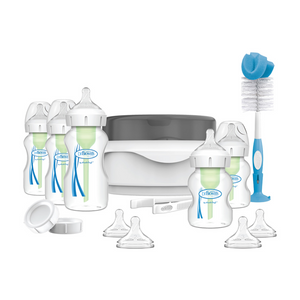
How to care for newborn baby skin
Caring for a newborn baby can feel like a minefield at times! So many recommendations, so many things to consider and that's before you've even begun to think of settling into any form of routine around feeding and sleeping. One thing that can feel particularly overwhelming is navigating skincare for your newborn. Especially with so many products on the market and recommendations from others.
When your baby is born, the top layer of their skin is particularly thin and therefore, extremely sensitive. After around a month, their skin will form new protective barriers which will naturally protect it more. With this in mind there are a series of considerations to take into account when it comes to caring for their skin.
That's where we are here to help by breaking it down to the basics, so you can concentrate on the more important stuff. Like cuddles with your new baby.
When should I give my baby their first bath?
The World Health Organisation recommends delaying your babies first bath for at least 24 hours after birth. Although some parents may leave it a little longer. It can also depend on if your baby came early, as premature babies have more sensitive skin. If this is the case always seek advice from medical professionals before introducing a bath to your routine.
When your baby is ready, you don't want to submerge them into the water for the first few weeks. Especially if they seem to not like it or if their umbilical cord hasn't dropped off yet. Whilst some babies will thrive in water, some may not be as keen! Just a few centimetres in the bottom of the bath will be absolutely fine to introduce them to the water.
For the water temperature, you need to ensure it is no warmer than 37 degree Celsius. If you can use your elbow to check, if you're confident to gauge it yourself
'Topping and Tailing' is also an easy way to introduce your baby to water as part of their routine, and instead of putting them into the water to bathe, you could pop them on their changing matt with some towels and use cotton wool with warm water to clean them. Simply dip the cotton wool in the warm water and gentle wipe around key areas such as eyes, ears, under their chin and genital areas. Always changing the cotton wool when you clean a different part. Pat dry when you are done, paying attention to skin folds, talking to and reassuring your baby throughout.
If you baby doesn't seem to like the bath, you can try and make them more comfortable by putting a warm muslin cloth across their chest whilst you clean the rest of them and be sure to have you towels close by ready for when your baby is out of the water. They cannot regulate their temperature at this stage, so can feel the difference between the warm bath and cool air significantly!
How often should I bathe my baby?
It is entirely up to you (and your baby!) how often you bathe them. Whilst some caregivers opt for a bath as part of their nightly routine and religiously give their baby a dip daily, some can bathe their little one 2 or 3 times a week.
If your baby really doesn't take to the water well, try not to force it. By consistently doing something that they kick against you can build a negative association and make the task even more challenging in the future.
Read the signals, check the signs and do what is best for a happy baby and happy you!
Can I bathe my baby if their umbilical cord is still on?
Whilst your baby has their umbilical cord clip on, you want to keep that area out of the water. If you're not comfortable with putting the baby for risk of submerging their cord stump, then the topping and tailing method may be more suitable instead, whilst you get used to your baby bath routine.
It usually takes around two weeks for their cord to fall, so be patient and keep an eye on it's healing and progress. If there are any signs of infection contact your health visitor or GP as soon as possible.
Other tips looking after newborn baby skin:
- Only use water for the first few weeks of bathing your baby. When they are newborn their skin needs time to build up natural oils and can be more sensitive.
- When you do introduce products opt for fragrance and SLS free, as these can be more harsh on a newborns skin.
- Don't use any creams, moisturisers or wipes on your baby until they are at least a month old (if they arrived on time). Water and cotton wool is your best friend in the first weeks. Especially for nappy changes.
Did you know?
When babies are born their skin is covered in a white substance called 'vernix'. If a baby is overdue, they may not have this as it may have already been absorbed into the skin when inside the womb! The vernix helps to protect the skin and also acts to moisturise it, so the longer it remains on your baby after birth, the softer their skin may be! The vernix also helps to protect the baby from germs by helping the development of the 'acid mantle' - a protective layer that gives your baby's skin extra immunity!


